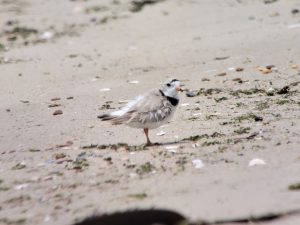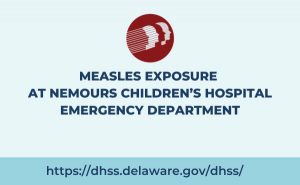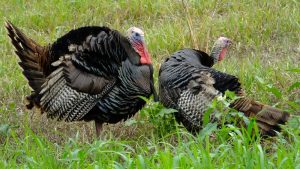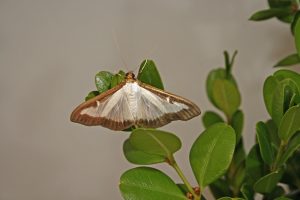DOVER – DNREC’s Division of Fish & Wildlife Mosquito Control Section is again asking for the public’s help in monitoring West Nile virus in Delaware by reporting the discovery of sick or dead wild birds that may have contracted the virus. West Nile virus (WNV) is a mosquito-borne disease of concern to human health and to owners of unvaccinated horses.
Beginning today, the Mosquito Control Section requests that the public report sick or dead birds of the following species only: crows, blue jays, cardinals, robins, hawks or owls, plus clusters of five or more sick or dead wild birds of any species. Bird specimens should have been dead for less than 24 hours and not appear to have died or been killed by other obvious causes.
“We are interested in when and where West Nile virus might first appear in Delaware this year and in monitoring the timing and locations of its possible spread throughout the state,” said Dr. William Meredith, Delaware Mosquito Control administrator. “Our sampling strategy this year will be to collect and test a sample of wild birds found throughout the state from early June to late September.”
Birds collected by Mosquito Control are processed by the Delaware Department of Agriculture’s Poultry & Animal Health Lab, and are then submitted to the Delaware Division of Public Health (DPH) Laboratory for virus testing. From early July through mid- to late October, Mosquito Control also will operate its statewide network of about 20 sentinel chicken stations placed in prime mosquito areas, which “keep watch” for WNV and eastern equine encephalitis (EEE), another mosquito-borne viral disease that affects horses and humans. The DPH lab tests blood samples from the sentinel chickens for both viruses to help indicate where WNV or EEE has been transmitted by mosquitoes from wild bird hosts to other animals, possibly leading to an increased risk of exposure for humans or horses.
“The prevalence of prime mosquito production habitats in Delaware, combined with our high human population density, presents quite a challenge, but our effective approach to controlling mosquitoes has helped reduce the frequency of West Nile virus transmission and prevent large outbreaks,” Dr. Meredith said.
In 2015, two mosquito-related human cases of WNV were reported in Delaware, neither of them fatal. No human cases of WNV were reported in 2014, although three cases occurred in 2013 with no fatalities. A resurgence in Delaware as well as the rest of the country occurred in 2012, when there were nine human cases and one fatality in the state. WNV is transmitted to humans primarily by the common house mosquito, and possibly by Asian tiger mosquitoes. The disease first appeared in Delaware in 2001, with a peak year in 2003, which saw 17 reported human cases and two human fatalities, as well as six WNV-stricken horses. From 2004 through 2011, WNV numbers were lower in Delaware. Only one human case of WNV was reported in 2011.
In 2015, the Centers for Disease Control (CDC) nationwide figures show 2,060 reported human cases of West Nile virus resulting in 119 deaths, with the most cases occurring in descending order in California, Texas, Colorado, Arizona, Oklahoma and Illinois. Regionally, 52 WNV human cases were reported in New York during 2015 with one death, 45 cases occurred in Maryland with five deaths, 30 in Pennsylvania with one death, 25 in New Jersey with two deaths, 21 in Virginia with one death and four with no deaths in the District of Columbia.
Due to complicated environmental reasons, wild birds are considered better indicators of WNV early in the season from May through July than Mosquito Control’s sentinel chickens, which become better indicators later, from August through October. Weather conditions could also impact this year’s West Nile numbers, whether found in wild birds, sentinel chickens or mosquitoes themselves, as outbreaks can be more severe during abnormally hot years, with 2012 a good example. Within any given year, regardless of total numbers of cases, the period of greatest concern for disease transmission is in late summer and early fall, Dr. Meredith said.
Zika and chikungunya viruses are two other mosquito-borne diseases currently found in South and Central America and the Caribbean, and there is some concern about these viruses possibly occurring in local mosquito populations in southern and Mid-Atlantic areas of the U.S., including Delaware. Neither of these two viruses involves wild birds as hosts, but rather are transmitted by mosquitoes person-to-person, so monitoring wild bird populations or sentinel chickens would not be an effective means of detecting these viruses in local mosquitoes. For further information on preventing Zika visit: http://dhss.delaware.gov/dhss/dph/zika.html
Dr. Meredith also noted that there is no cause for alarm that uncollected specimens might transmit WNV to humans, or to pets that come in contact with a sick or dead bird. Should the public encounter dead birds, they can be left to decompose in place or they can be buried or bagged and disposed of in the garbage. When disposing of any dead bird, he advises avoiding direct skin contact by wearing gloves and/or by using a shovel.
Sick or dead birds can be reported to the Mosquito Control Section between 8 a.m. and 4 p.m., Monday through Friday, by calling Mosquito Control’s field offices:
- New Castle County and northern Kent County from Dover north, call Mosquito Control’s Glasgow office at 302-836-2555
- Remainder of southern Kent County and all of Sussex County, call Mosquito Control’s Milford office at 302-422-1512
Callers to Mosquito Control field offices after business hours or during weekends or holidays can leave voicemail. Callers should give their name, phone number, address and leave a brief message. However, the public should be aware that some calls left more than 24 hours before Mosquito Control can review them – typically involving times between Friday evening and Sunday morning when staff might not be present – may result in birds becoming too deteriorated for virus testing.
The phone numbers above may also be used to report intolerable numbers of biting mosquitoes to help the Mosquito Control Section determine when and where to provide control services. For more information on Delaware’s Mosquito Control program, please call the main office at 302-739-9917, or click Delaware Mosquito Control.
For more information about West Nile virus in humans, please contact the Delaware Division of Public Health at 302-744-1033 or 888-295-5156. For more information about West Nile virus in horses, eastern equine encephalitis or vaccines, please contact the State Veterinarian at the Delaware Department of Agriculture at 800-282-8685 (Delaware only) or 302-698-4500.
DNREC’s Mosquito Control Section provides statewide services to about 945,000 Delaware residents and 7.5 million visitors annually to maintain quality of life and protect public health by reducing the possibility of mosquito-borne illnesses such as West Nile virus, eastern equine encephalitis, chikungunya and Zika virus. Throughout the warmer months, Mosquito Control monitors and treats mosquito populations that emerge from wetland areas throughout the state, including ditches, stormwater ponds, wet woodlands and coastal salt marshes, using EPA-registered insecticides. These insecticides have been determined by EPA to pose no unreasonable risk to human health, wildlife or the environment when professionally applied. The Section also works year-round on water and marsh management projects designed to reduce mosquito populations, and provides the public with information on dealing with mosquitoes, from reducing backyard mosquito production to avoiding mosquito bites. For more information, call 302-739-9917 or visit http://de.gov/mosquito.
Media Contact: Joanna Wilson, DNREC Public Affairs, 302-739-9902.
Vol. 46, No. 214


















































































